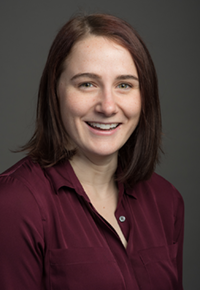PGY-3 Internal Medicine and Clinician Investigator Program – McMaster University
ResidentSenior ResidentClinician Investigator Program Internal Medicine McMaster University
July 2018
About Me
My name is Caitlin Lees, and I am a PGY-3 Internal Medicine and Clinician Investigator Program (CIP) resident at Dalhousie University. I will also be starting subspecialty training in Palliative Medicine after completing my second year of CIP.
I grew up in Cambridge, Ontario. I had initially planned to become a professor in cultural studies, and actually completed an undergraduate degree in Film Production and a Master of Arts in Cinema Studies. During my MA, my roommate was in medical school. After she invited me to one of her lectures, I decided to apply to medical school and was accepted to McMaster University.
I enjoyed my Internal Medicine residency, but I missed the scholarly activity and research that I had done in my days as a Cinema Studies graduate student. I decided to apply to the Clinician Investigator Program (CIP), a residency training program of flexible length (typically 2-3 years, depending upon the additional training pursued by the resident), which is designed to train clinician-scientists. During the CIP program, a resident spends the majority of one’s time in a graduate studies program of choice, gaining the skills and training necessary to become a researcher. To ensure the resident does not become de-skilled, a small proportion of time is spent in clinical activities. It’s incredibly challenging and rewarding.
Non-Clinical Life
Why did you choose to pursue this current role?
Even though my previous education was in the arts, the process of academic inquiry is really the same – questioning and investigating. After switching career tracks and pursuing medicine, I found I really missed research, but lacked the skills and background necessary for research in a medical context. CIP has been an amazing opportunity to gain the tools I need to make research a significant part of my career.

What attracted you to a non-clinical career?
My career will have a clinical component, but I hope that research will occupy much of my time. I am happier and more satisfied with my professional life when there is a balance between patient care and research. I appreciate the diversity in how my day is structured and enjoy never being over-saturated by just one aspect.
What additional training if any, did you pursue before or are you currently pursuing now for this current role?
I’m currently completing a Master of Science in the Medical Research Graduate Program. My thesis project investigates how the timing of palliative care impacts overall survival and aggressiveness of care at end of life in patients with advanced pancreatic cancer. I spend my time applying for grants, collecting data, performing statistical analysis, writing my thesis, and ultimately producing scholarly papers and presentations. I do Internal Medicine call two or three times a month.
What are your current interests (e.g. leadership activities, research)?
CIP has provided me with the flexibility to pursue other activities. I’m currently president of Maritime Resident Doctors (my provincial housestaff association), a board member at Resident Doctors of Canada, and I participate in numerous committees at Dalhousie University and with the Royal College. I’m also involved in my community as an assistant coach of a kids’ hockey team and by volunteering with Big Brothers Big Sisters.
How does your medical training impact your work today?
My medical training has really informed my research. The research questions I’ve pursued have all followed from questions that have arisen in the course of providing patient care.
Which of your personality characteristics are particularly helpful in your field?
Being self-directed and disciplined is very important to research. There are very few external deadlines, so self-motivation is necessary to be a productive and successful researcher. Enjoying collaboration with others is also helpful, as many larger projects are team-based, while smaller projects benefit from the input of others as well.
What are the best aspects of your current role?
The freedom to study and investigate a topic I’m interested in! Very few jobs allow that kind of opportunity. I also really appreciate the flexibility of having protected research time. Managing my own schedule means I can set aside time for committee work, leadership activities, or personal interests.
What are the most challenging aspects of your current role?
With dedicated research time, my schedule is more flexible than most residents’ and it’s easy to take on too much and say “yes” to everything. Sometimes, this means long evenings writing a paper because my day was occupied by committee meetings or other side projects. Over time, I’ve become better at understanding how to juggle a number of responsibilities at once and when to say “no”.
Sometimes, research can be frustrating. It can take months to get approval to use a dataset, collaborators can be slow to give feedback, data collection can be infuriatingly incomplete, the statistics don’t always make sense, and study results can end up being so biased that the word “evidence” doesn’t really apply. But overall, these frustrating moments are fleeting and part of the challenge that makes research fun.
What is one question you’re often asked about your decision to pursue a non-clinical career?
As additional training, CIP extends a usual residency training program by 2-3 years. I’m often asked why I would commit to spending even more years as a resident. I usually respond by talking about how interesting and challenging research is, the opportunities it has afforded me, and that ideal balance of clinical, educational, and research work that I anticipate having in my career.
What would you recommend to other residents considering a similar career path?
I recommend talking to your program director about the Clinician Investigator Program as early as possible. My program and department have been incredibly supportive, both morally and financially. The Department of Medicine committed to funding my salary for an additional two years of residency training, assisted me in finding a project and supervisor, and has accommodated my goals in every way possible. When I started my training in CIP, I had no idea that it would create so many opportunities for me. It’s enriched my personal and professional life greatly and I would absolutely do it again.

What is your work-life balance like, and how do you achieve this?
During Internal Medicine residency, my work-life balance improved over time. In first year, I was so focused on work that I lost sight of my personal life. This improved as I learned to prioritise hobbies and relationships in my off-duty time during second and third year.
As a CIP resident, I have great flexibility in my schedule. This means I can attend pottery class or go skating in the morning and use my evening to work on research. I’m still very busy, but there’s flexibility in the time of day I complete my work. I’m lucky enough to have a partner with a research background and a similarly busy job that also sometimes entails evening work, and he’s an enthusiastic supporter of my career.
Do you still engage in clinical work? What does that look like?
Clinical work is still an important part of my program, but is primarily intended to maintain competence and takes up a relatively small proportion of my time. I’ve worked with my program director and residency program committee to create clinical opportunities that align with my own objectives. In general, I do two call shifts a month, supplemented with some outpatient clinics of my choosing. Even though my clinical work is infrequent, I’ve become a much more confident and independent resident over my time in CIP.



